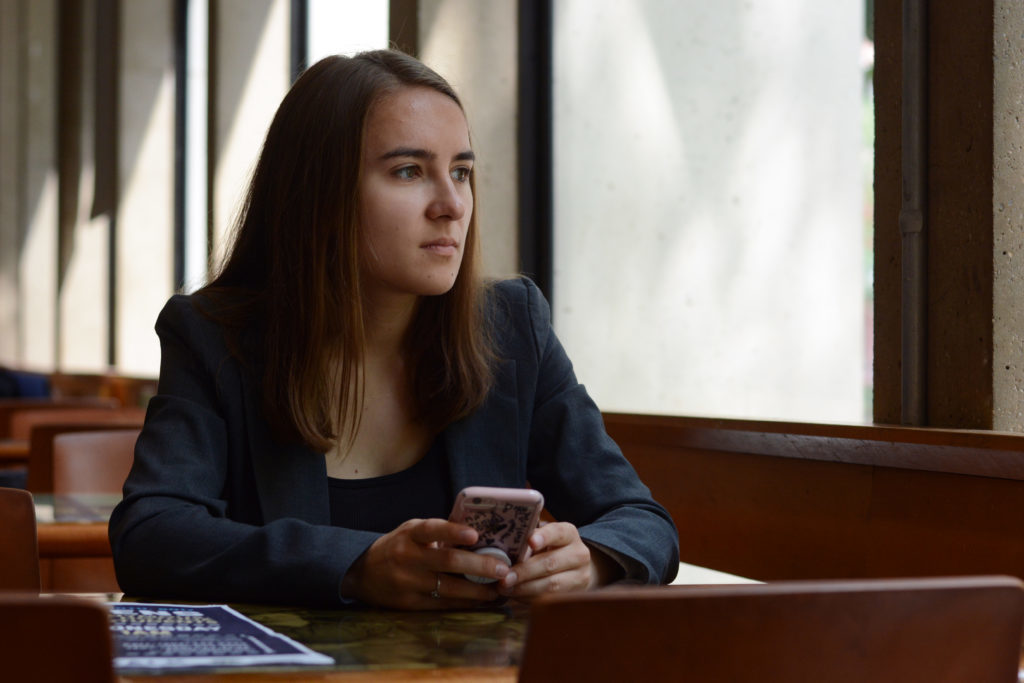GW’s anonymous peer hotline is adding texting and online chat options this fall to provide free mental health services to students who prefer not to call in.
The textline will go live Sept. 10 and will provide students with free peer counseling, similar to the already-established phone hotline. Student leaders and experts said the added feature will eliminate anxiety for students in need of help but may feel uncomfortable meeting in person or speaking over the phone.
Anastasiya Parvankin, the director of GW Listens, said she noticed while working for other support hotlines that more people used online chat services than support services over the phone.
“It’s hard talking about problems and struggles, and I feel like being able to text or type about it is just so much easier,” Parvankin said. “I really hope that helps build traffic.”
GW Listens officially launched in January after months of delay and years of planning and preparation. About 11 student volunteers work the phone lines for the hotline, which is open nightly.
The program aims to provide students with accessible, free peer counseling and gives students who work for the hotline an opportunity to provide direct support to their peers, Parvankin said.
Parvankin said she made the textline a top priority for the program after the original hotline got off the ground. Members of GW Listens began coordinating over the summer to develop the textline, she said.
Student volunteers will man the textline by logging into a secure website profile and responding to anonymous texts from students facing mental health challenges like anxiety and depression, she said.
“It was critical that we developed a digitally secure and anonymous platform, something we were able to build.”
Students utilizing the new service will be able to text a number to access a peer counselor or a chat window that will be linked on the Student Association’s website. The student volunteers will respond using a separate chat window, guaranteeing the anonymity of the student seeking help, Parvankin said.
“Sometimes people have various issues and various struggles and they don’t want to verbalize anything,” Parvankin said. “I think sometimes talking to people on the phone is sometimes scarier and harder than email or text or chat.”
Volunteers who will work the hotline are generally recruited during the fall semester, and all volunteers are required to take an upper-level psychology course the following semester before working with the program.
Parvankin said she wants to collect feedback from students who use the new textline. The surveys will then collect data on when the conversation occurred and what type of help was needed to allow the team to cater their resources to respond to anxiety or depression, she said.
James Harnett, the director of information technology for the SA, said he developed the software used to run the textline and selected the chat provider that allows students to connect with GW Listens online through the SA’s website.
“It was critical that we developed a digitally secure and anonymous platform, something we were able to build,” he said in a email.
Sydney Nelson, the SA’s executive vice president, said the texting program will provide students with a more accessible means of getting help.
“I think this is a great first step in making sure that mental health support is more accessible to all students and also in the format that they use it,” Nelson said. “It’s a lot easier to be in class texting on the GW Listens support line than having to go to the corner and talk on the phone.”
Mental health experts said that an anonymous peer textline will offer students an accessible and familiar platform to receive counseling, but it also won’t allow for face-to-face communication, which can be vital in a time of crisis.
“The plus side is students come to college now, that’s their preferred mode of communication.”
David McBride, director of the University Health Center at the University of Maryland, said providing students with an alternative to phone counseling can ease them into the counseling process and make them more comfortable making the difficult decision to seek help.
“In theory, not having to give one’s name may lower the barrier to seeking help,” McBride said in an email. “For minor concerns, I think that anonymous peer counseling is a way to get connected, have questions answered and be directed to a more definitive system of care.”
Amy Reynolds, a fellow at the American Psychological Association and an associate professor of counseling and educational psychology at the University at Buffalo, said a textline will offer students a form of communication they are most comfortable with.
“The plus side is students come to college now, that’s their preferred mode of communication,” she said.
But Reynolds said a text-based system can also limit the depth of communication between the peer volunteer and the student reaching out in person.
“Without non-verbals and facial expressions and all those other subtleties, people can misinterpret or mis-hear what’s going on in a text-to-text interaction,” Reynolds said. “And because it’s anonymous, there’s no way to follow up necessarily.”
Cayla Harris contributed reporting.





